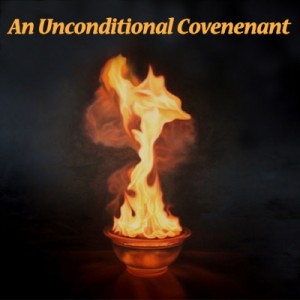 A covenant is a “formal binding agreement defining relationships and responsibilities between two or more parties.” Biblical covenants were often “cut,”—as in the case of the Covenant that God made with Abraham (Gen 15:18). It was facilitated when Abraham took “a heifer, a goat, and a ram … along with a dove and a young pigeon … and cut them in two and arranged the halves opposite each other” (Gen 15:9-11).
A covenant is a “formal binding agreement defining relationships and responsibilities between two or more parties.” Biblical covenants were often “cut,”—as in the case of the Covenant that God made with Abraham (Gen 15:18). It was facilitated when Abraham took “a heifer, a goat, and a ram … along with a dove and a young pigeon … and cut them in two and arranged the halves opposite each other” (Gen 15:9-11).
In order to “ratify” the agreement, Abraham and God should have walked between the pieces together. But, the Lord caused Abraham to fall “into a deep sleep” (Gen 15:12 [NIV]) and “passed between the pieces” (Gen 15:17 [NIV]) by Himself!—He manifest Himself as “a smoking firepot with a blazing torch” (Gen 15:7)—fire frequently being used to manifest God’s presence (cf. Exo 3:2; 13:21; 19:18; Isa 4:5; 31:9; Heb 12:28-29).
Therefore, the covenant that God made with Abraham is unconditional! Why? Because God is not only responsible for His “part” of the agreement, but for Abraham’s “part” as well! That is why God has acted on the behalf of His people Israel, over and over again, in spite of their unwillingness or inability to walk in His ways.
The Lord promised Abraham that “all peoples on earth will be blessed through him” and his descendants (Gen 12:3), and that in spite of their sin, He would “not reject them or abhor them so as to destroy them completely, breaking (His) covenant with them. I am the LORD their God” (Lev 26:44 [NIV]).
Isn’t this the basis for Paul’s strongly worded response to the question of Israel “election” in Romans 11:1-2? “I ask then: Did God reject his people? By no means! I am an Israelite myself, a descendant of Abraham, from the tribe of Benjamin. God did not reject his people, whom he foreknew …”